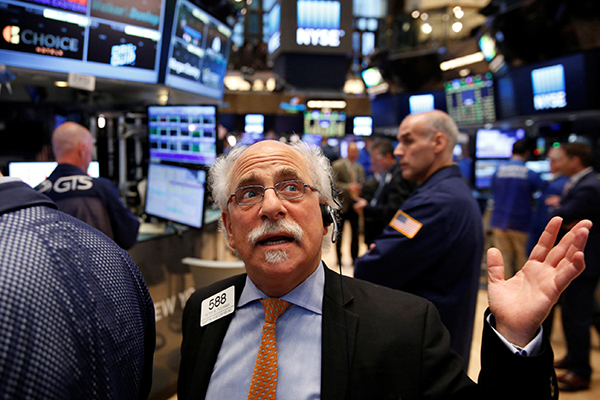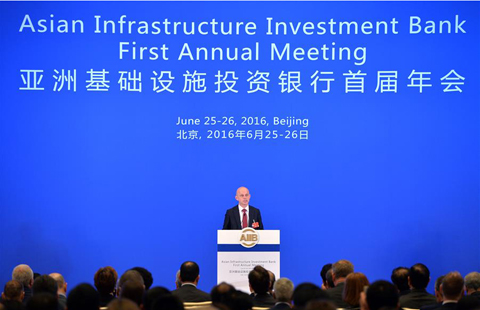No big Brexit worries for now
(Agencies/Xinhua) Updated: 2016-06-27 10:13
 |
|
Unlike the New York Stock Exchange (above) which tanked on Friday following the Brexit vote, China's stock and currency markets will see only a "psychological" effect, say economists. [Photo/Agencies] |
Economists see limited impact of the UK-EU divorce on China's stock market this week
Britain's decision on Friday to leave the European Union will have only a limited effect on China's stock market this week and perhaps even boost the yuan's status as a global currency, economists told Xinhua.
"The decision may actually accelerate the competition between other European cities for yuan businesses, and as a result, Britain may have to provide Chinese institutions with better terms," said Xiang Songzuo, deputy director of the International Monetary Institute at Renmin University of China.
Lian Ping, chief economist of State-owned Bank of Communications, said, "The status of London as an offshore yuan trading center will be affected and that could open up opportunities for yuan business in Frankfurt, Luxembourg or Zurich."
Xiang agreed. "Brexit will result in both a weaker pound and euro, which will raise yuan's exchange rate against these currencies."
Global stock markets tumbled on Friday following the Brexit vote. China's benchmark Shanghai Composite Index dropped 1.3 percent while the offshore yuan against the US dollar also slumped.
The impact of "Brexit" on the yuan and the Chinese stock market is only "psychological" and the long-term value of Chinese stocks is still dependent on economic fundamentals, Xiang said.
"Markets overreact all the time. For China, it will be only about a week before it gets back to normal," said Xiang.
The same cannot be said of the global markets though.
One way to assess how much pain looms for global stocks post-Brexit is to figure out who needs to sell.
Strategists analyzing fund flows say computer traders, exchange-traded funds or ETFs and individuals are among those who piled into European stocks expecting the UK to vote Remain rather than Leave.
Brexit will unleash as much as $300 billion of selling by automated quant programs in the already-battered US stock market, according to Marko Kolanovic, a derivatives strategist with JPMorgan Chase & Co.
His colleague Nikolaos Panigirtzoglou looked at ETF and government data and concluded that US investors own a lot more European stocks than they did during the sovereign debt crisis four years ago.
Equity investors in the US would be wise to stay away until quant managers finish the work that was forced on them by Friday's volatility, Kolanovic wrote Friday. About $2.6 trillion was erased from global share markets. Investors worried Brexit would snarl commerce and snuff out the economic recovery.
Not just investors, some companies, like China Logistics Property Holdings Co, the warehouse developer backed by Carlyle Group LP, reacted to Brexit news with swift moves.
China Logistics Property will delay the launch of its $400-million Hong Kong initial public offering, people with knowledge of the matter told Bloomberg.
The Shanghai-based company will postpone the start of the share sale until Wednesday due to volatile market conditions related to Brexit, according to the people.
It had originally scheduled to begin taking investor orders on Monday, one of the people said, asking not to be identified as the information is private.
The IPO is set to take place during one of the most stressful times for global markets in years. Hong Kong's benchmark Hang Seng Index slumped the most in four months Friday after the Brexit vote outcome.
Hong Kong first-time share sales have raised $5.6 billion this year, down from $16.7 billion the same period in 2015, data compiled by Bloomberg show.
- China's Alipay could take stake in Germany's Wirecard: report
- AIIB makes quick rise to global prominence
- China Vanke says shareholders seek to oust chairman, 11 directors
- Baosteel, Wuhan Steel announce restructuring plans
- Digital strategies are no tall order
- Brexit brings pains and gains for different groups
- Tesla charging posts to become ubiquitous and enable long drives in future
- Exploiting Summer Davos to promote Tianjin among investors


















